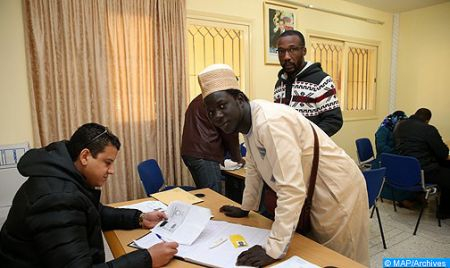Efficient Implementation of Marrakech Pact: a Challenge in Times of Pandemic
Several senior pan-African officials and representatives of international organizations in charge of migration issues called, on Wednesday, for an efficient implementation of the provisions of the Global Compact for Safe, Orderly and Regular Migration (Marrakech Compact), seeing it as a major challenge to be met in times of pandemic. Speaking at the opening of the first intergovernmental meeting for the Regional Review of the Global Compact for Safe, Orderly and Regular Migration, organized at the initiative of the United Nations Economic Commission for Africa (ECA), the International Organization for Migration (IOM) and the United Nations Network on Migration, participants reviewed the various stages that led to the elaboration of the Marrakech Pact, as well as the main challenges to be met in the field of migration at the continental level, in the wake of the novel coronavirus pandemic. In a speech read on her behalf at this conference, held in virtual mode under the chairmanship of Minister of Foreign Affairs, African Cooperation and Moroccans abroad, Nasser Bourita, the Under-Secretary-General and Executive Secretary of the ECA, Vera Songwe, said that migration has played a pivotal role in the economic growth of nations, stressing, in this regard, that the migrant remains an essential lever of the global economy, particularly African one. The UN official noted that migration in Africa has increased by 76% from 15 million migrants in 2000 to 26.5 million in 2019,” noting that most of these migrants, or 75%, have moved within the continent. “Migration and human mobility are closely linked with the opening up of trade”, she added, noting that “the African Continental Free Trade Area (AfCFTA) came into force on 1 January 2021 and marks a significant milestone in realising the free movement of people, goods, and capital on the continent”. However, she regretted, this progress has been limited by the progress of Covid-19, expressing ECA’s determination to strengthen collaboration with all African countries in order to consolidate regional migration policies and programs. In the same vein, IOM Director General Antonio Vitorino said that the Marrakech Pact is an essential guide to enhance the benefits of migration and address its challenges through international cooperation, advocating for the adoption of a comprehensive approach to the implementation of the Global Compact for Safe, Orderly and Regular Migration. “We must ensure that in the implementation of the pact, the comprehensive approach is respected and promoted,” he said, expressing the hope that this meeting will highlight the 23 objectives of the Marrakech Pact as well as the best way to progress towards their full implementation. Also, Vitorino said that the COVID-19 pandemic has highlighted the vital role that migrants play in promoting healthy, prosperous and inclusive societies. For her part, the Commissioner for Social Affairs of the African Union Commission (AUC), Amira El Fadil, reviewed the efforts made at the level of the pan-African organization to advance the plan of action for the management of migration on the continent. The official expressed, in this regard, the commitment of the AU Commission to the Marrakech Pact, which “reflects the aspirations of the people”, noting that the effective implementation of this pact is faced with several challenges, particularly the mobilization of financial resources and skills, as well as reducing the effects of the pandemic of Covid-19, which “has disrupted all aspects of our lives”. The UN Special Rapporteur on the human rights of migrants, Felipe Gonzalez Morales, considered that the Marrakech Pact on Migration is a far-reaching initiative that requires cooperation between all stakeholders for the effective implementation of the objectives of the pact, the result of “collaborative work”.

